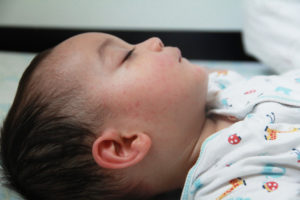
If there is a defect in the central nervous system, that may be what causes babies to have seizures. Seizures occur because of a dysfunction in the nerves sending signals to the brain.
An anomaly happens in the electrical currents passing information through the neurons, causing a disruption in the messages being sent or received. When this disruption prevents a message from reaching its destination, the brain becomes off-kilter, creating a full-body reaction known as a seizure.
How Nervous System Issues That Lead to Seizures Occur
Issues in the central nervous system that lead to seizures can result from a traumatic event or an underlying condition, such as a stroke, a head injury, or an infection. In the case of newborns, seizures most commonly occur because of hypoxia-ischemia. This means the baby’s brain did not receive enough oxygen or blood flow during the birthing process. Other complications that may cause seizures in your newborn can include:
- Infections during pregnancy, such as sepsis, Zika virus, or Group B strep.
- Hypoglycemia.
- Newborn brain bleeding.
- Hypocalcemia.
- Hypernatremia.
- Hyponatremia.
Neonatal seizures are not common. According to the Merck Manual, they only occur in 1.4% of babies who are born full-term. The prevalence of seizures in premature babies is significantly greater, at 20%, because their brains may not be fully developed yet. Additionally, low birth weight may be a factor in causing seizures.
"If your child was born with a birth injury, or cerebral palsy, we can help."
Types of Neonatal Seizures
There are a few different types of infant seizures that can occur. They each come with their own signs and symptoms and have differing levels of severity, which may result in various outcomes. The different types of seizures in newborns are classified as follows:
- Subtle
- Tonic
- Clonic
- Myoclonic
A newborn baby will most likely experience subtle seizures. The signs of this type of seizure are subtle and difficult to identify because they can often line up with normal newborn characteristics, like staring, random eye movements, wide eyes, sucking, smacking, and chewing. Considering this, subtle seizures are often hard to diagnose without diagnostic testing.
You should mention these signs to your doctor if you are concerned that your baby may be having seizures. A doctor can look into your family history and perform a physical exam, after which he or she may schedule an electroencephalography (EEG), laboratory testing, and cranial imaging for your child. These diagnostics can screen for abnormalities in your child’s vitals and brain.
Treating Neonatal Seizures
Once your doctor has diagnosed the condition, you can begin treatment. Considering that treatment is mostly based on the underlying condition causing the seizures, there may be several different plans available. Your doctor will discuss the treatment options pertaining to your child’s case.
Many times, treatment can include anti-seizure medication. Anti-seizure drugs can include the following:
- Phenobarbital
- Levetiracetam
- Fosphenytoin
- Lorazepam
Like any drug, there are side effects with these medications, and an infant may be especially vulnerable to them. It is important to discuss your options with a doctor and determine what is best for your child.
"We know first-hand what you are going through."
Prognosis of Newborn Seizures
There is not much solid evidence of newborn seizures causing serious long-term complications. However, a baby’s brain is most vulnerable during the neonate period, particularly in the first few days, and longer for premature babies.
Consequently, research has discovered persistent seizures in a baby can prevent the brain from creating new, fully formed neurons, based on animal studies. This can lead to a lack of mental capacity and behavioral disorders as the brain matures.
The type of seizure and the underlying cause is significant when it comes to the prognosis. Babies who experience seizures because of hypoxia-ischemia, subarachnoid hemorrhage, hypocalcemia, and hyponatremia may fair well.
Meanwhile, babies with severe brain bleeding or idiopathic seizures have the highest rate of suffering serious life-long problems, particularly neurological and developmental disorders. Some neonatal seizures will result in epilepsy, which is a medical diagnosis referring to recurring seizures throughout life.
"Our Birth Injury Lawyers have recovered over $750+ Million on behalf of our clients."
Legal Recourse for When a Birth Injury Is What Causes a Baby to Have Seizures
If your baby experiences seizures as the result of an injury during your pregnancy or delivery that a medical professional should have prevented, you may have the right to file a lawsuit. An attorney at the Birth Injury Lawyers Group can review your case and determine your eligibility. Get started on your case today by calling for a free consultation at (800) 222-9529.
"We are committed to helping families who have suffered medical negligence."
